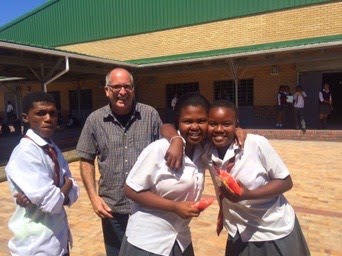"But if anyone has the world's goods and sees his brother in need, yet closes his heart against him, how does God's love abide in him?" --1 John 3:17
Today a bunch of us went back into the townships of Philippi and Sweet Home in order to drop off some more food parcels and to continue filming.
It was blazing hot - nearing 100 degrees - and felt even hotter since we had to adhere to the dress code of long pants and closed-toed shoes. As we drove through the dilapidated streets, eyes watched us intently - some knew the Bridges of Hope logo on the outside of the van, while others were intrigued by the go-pro camera we had strapped to the front fender. And the interest was mutual - as we drove, my eyes were straining to take in every detail, to gain a better understanding of what life was like here.
Some of the sights:
--Heaps of trash, old furniture, rusted fences, puddles of murky water, stray dogs, and the occasional goat, rooster, or sheep
--Women with babies strapped to their chests by means of a thick blanket wrapped around them several times
--Children pushing rubber tires down the sidewalk
--Small huts selling food and tools
--Tall poles with speakers strapped to the top, which Dennis told us the government used during apartheid to control and pacify the people when protests broke out
Aside from filming, we got to briefly stop by the informal school and hang out with the little kids during their school session. The one-room classroom was shabby and hot, with only a few posters on the walls. The bathroom was in the form of a large bucket in a back corner. The children - all between the ages of 4 and 7, or so - were excited we were there, and loved it when we joined in on their songs and games.
.jpg)
.jpg)
We also stopped by the high school, where the kids were older and more distinguished-looking in their crisp school uniforms. One boy stood out, as he was not in uniform - we were told later that he was allowed to opt out as he had just returned from being circumcised. Apparently it's a rite of passage here - when a boy turns 18, he is taken into the wilderness and circumcised with a dull knife. He must endure this process without pain medication and he cannot cry. He then spends a month in the bush healing, and when he returns he's given a set of fancy clothes and has earned the respect of his community. (The boy we saw at the high school clearly had a bit of an extra spring in his step.)
After that we paid a visit to the home of a woman who was diagnosed with AIDS five years ago. Sisanda, one of Bridges' Community Health Evangelists (CHEs), talked with her and translated to us that she has been feeling much better lately and is looking for work. With these things in mind, we all held hands and prayed with her.
Note: Not that long ago, it would've been almost unthinkable for someone to admit that they had AIDS. The community has already come a long way in breaking down the stigma of disease, and much of it is thanks to the work of people like Sisanda and the rest of the Bridges crew.
As we drove home, we realized that the stark contrast between the townships and the surrounding wine country is almost unbelievable. It is near impossible to fathom that two totally different worlds such as these can coexist just minutes away from each other.
"For there will never cease to be poor in the land. Therefore I command you, ‘You shall open wide your hand to your brother, to the needy and to the poor." --Deuteronomy 15:11
As we drove through the townships, I was overwhelmed with the unfairness of it all. Back in the day, White foreigners came to this country and took it away from the Blacks who were here first, and the results are still evident. The poverty and de facto segregation are simply appalling.
While no amount of progress can change all that's happened, we are at least moving slowly in the right direction. The other day, we asked one of the Bridges employees if he thought it was good that us Americans come and hang out with the people here, and he replied that it is indeed a good thing - "because," he said, "you guys [White people] come and you talk to us [Black people] like we're human beings."
That simple statement shows the heartbreaking reality here.
I feel extremely blessed to come from where I come from, but also to have the chance to be here and learn about all of this firsthand. There is so much need in this country, and all we can do is keep working, keep praying, and keep striving onward for better days. I'm thankful that there are people here working every day for justice, and that we have a Divine who loves us and wants every single soul to experience true peace.
Now on to a campfire devotional with the students :)
Liz
















.jpg)
.jpg)
.jpg)
.jpg)
.jpg)
.jpg)



.jpg)








.jpg)

.jpg)















